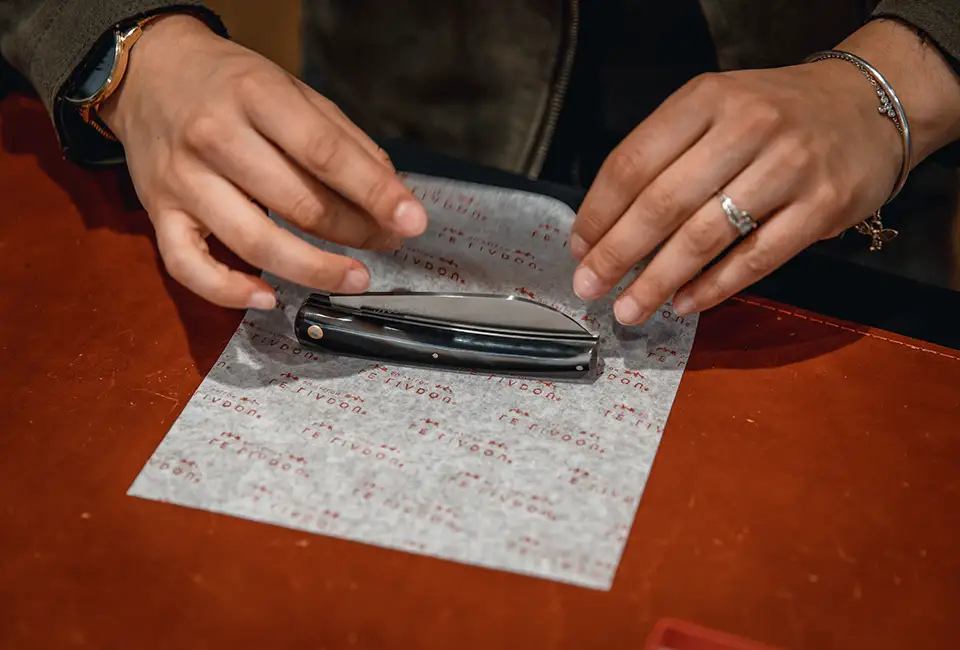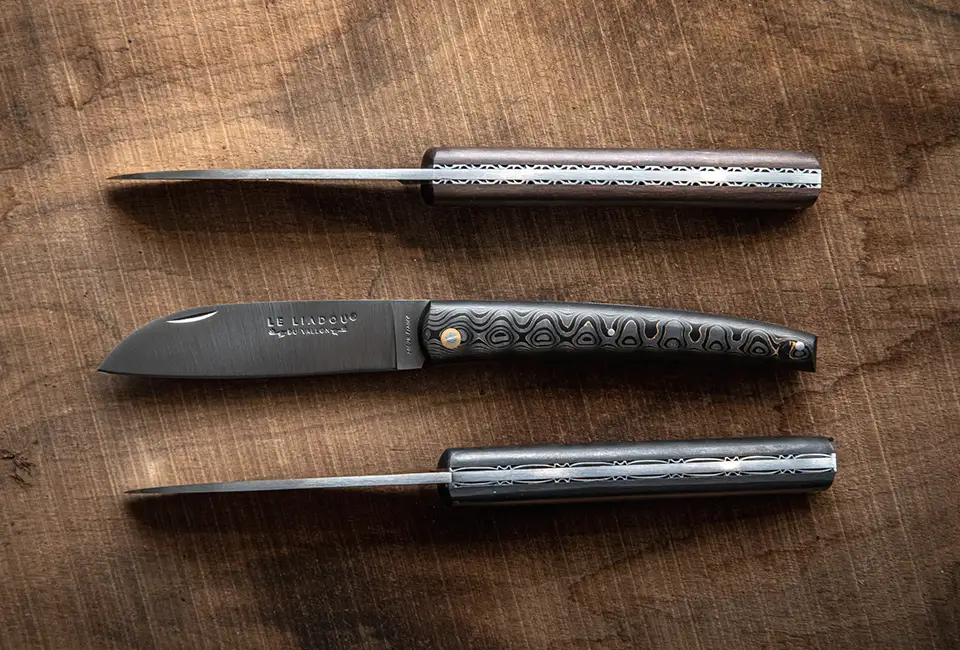Liadou du Vallon’s® workshop: where exceptional craftsmanship is placed at the heart of each creation
The ten steps involved in handcrafting a French pocketknife by Liadou®
Blades and handles crafted from the finest materials
Liadou® has rightfully become recognized as one of France’s most renowned high-end cutlery brands. Now available in various models, each pocketknife is crafted using artisanal manufacturing processes. Expert craftsmen, who have undergone a rigorous hiring process, meticulously complete the ten steps involved in creating these stunning works of French cutlery art.
The ten steps used to handcraft a French Liadou® pocketknife
Sawing rectangular scales
The artisans in our French cutlery workshop use a band saw to hand cut the finest raw materials into the scales that will become your Liadou® pocketknife’s handle.
Grinding with a lapidary saw
The scales are carefully ground down with a lapidary saw in order to achieve the perfect thickness so that the handle won’t have any gaps once it is mounted together.
Conditioning the blade
In order to strategically adjust the folding system of a handmade pocketknife, certain areas need to be sanded and smoothed. The Liadou® knife’s remarkably wide blade is in a league of its own when compared to other pocketknives on the market. This larger surface area allows it to undergo a specific grinding process that brings its cutting edge to a razor shapr finish without compromising its durability.
Preparing the handle
The spring, blade, scales and other parts needed for assembly are prepared, holes are drilled in the scales and chamfer cuts are made on the scales to prevent the rivets from shifting in their sockets.
Mounting the scales, springs and liners
At their workbenches, our expert French cutlery craftsmen work with a vice, anvil and hammer to handcraft your top-of-the-line pocketknife, fixing the two handle covers, liners and the spring before filing the blade.
Pre-shaping
We use a backstand grinder to pre-shape the bolsterless handle (4.2in or 4.7in) of your artisanal French pocketknife and use a belt sanding technique to ensure superior quality.
Assembling a Liadou® knife
Handcrafting a piece of high-end French cutlery requires a delicate blend of traditional savoir-faire and precise adjustments so that your pocketknife can open and close smoothly. We do this by adjusting the height of the spring through a meticulous sanding and filing process. This involves disassembling and reassembling your Liadou® as many times as it takes to achieve the perfect setting. The spring is placed in such a way that it keeps the blade from touching the center scale, preventing the blade from dulling over time. Now the knife is ready to be double riveted.
Shaping the handle
The handle of your artisanal pocketknife is shaped during a sanding process that uses increasingly finer sand paper grits. Our expert French cutlery craftsmen use precise movements to obtain the perfect curve and symmetry.
Finishing touches
Liadou’s® high-end French cutlery boasts finishing touches that can only be achieved through the careful attention our artisan craftsmen. The blades and various metal elements are expertly polished to a satin finish on a polishing wheel. Wooden handles are delicately polished with a cotton cloth.
Sharpening the blade with a belt sander
The last step involves carefully hand sharpening the blade of your Liadou® knife on a belt sander to achieve an exceptionally sharp cutting edge.
The artisanal techniques used to create your high-end French cutlery
Qualified artisanal cutlers, who are considered to be some of the best in their field, uphold France’s traditional cutlery crafting savoir-faire in Liadou’s® knife workshop located in Marcillac, where the very first Liadou® knife was made. This French pocketknife was created to be used in the vineyards in the Aveyron region. In fact, Liadou® means “binding or tying tool” in Occitan as it was used to split grapevine canes in order to tie them to trellises. The modern day Liadou® was awarded the “Fabriqué en Aveyron” label for perpetuating the region’s traditions and craftsmanship.
The 8 best tools for creating high-end French cutlery
In order to manufacture high-end French cutlery, Liadou du Vallon® employs skilled craftsmen who specialize in using specific custom-made machines:
• The metal parts are polished using a lathe to achieve a satin finish.
• An oven is used to heat the springs before they are tempered. Parts are heated to 1050°C (1922°F) before they are immersed in an oil bath.
• A professional-grade parts washer is used to remove polishing paste residue and friction marks from antler handles and other synthetic handle materials. The knives with wood or bone handles are manually cleaned with a cloth.
• A nylon cable drum is used to remove scratches and polish pieces.
• Grinding wheels and files are used for specific guilloche details.
• Equipped with a lapidary and an abrasive plate, the belt sander is used to plane the inserts, sand the spring and blade, and also to sharpen the blade.
• A drill press and an array of different sized drills are used to prepare the handle, spring, blade and scales before assembly.
• A band saw cuts and creates the initial shape of the scales that make up the handles. It is used for all of the materials - wood, antler, fossil, bone, resin, etc. - featured in our different Liadou® knife collections.
• The workbench, anvil and files are used to assemble and attach various parts of the knife and to file the rivets and other metal parts.
Liadou’s®High-end French cutlery pocketknives are crafted by expert artisans
Liadou du Vallon’s® French pocketknife collections
Truly one-of-a-kind and customizable, Liadou® knives are handcrafted using only the finest materials that undergo a rigorous process of selection to ensure that they meet our high standards in terms of sustainability and biodiversity protection. A Liadou® pocketknife is a high-end French cutlery product that comes with a lifetime warranty covering all manufacturing defects. We have created six pocketknife collections, each featuring different handles made with various materials and colors. Sheaths and leather cases are also available in an array of colors, allowing you to safely store your pocketknife or attach it to your belt.
Liadou’s® six French pocketknife collections:
• Liadou Original ®
• Liadou Table ®
• Liadou Exception®
• Petit Liadou®
• Liadou Tire-bouchon®
• Liadou Racing ®
Embodying the Aveyron region’s tradition and history, our French pocketknives are delivered to your doorstep in elegant gift boxes and accompanied by a Certificate of Authenticity as well as a lifetime warranty.
Explore Liadou’s® French pocketknife collections
Find your perfect Liadou® knife online or in-store at our Rodez and Marcillac locations
Are you looking to purchase a Liadou® knife? We invite you to browse our online shop or come see our collections in person at our French boutiques located in Marcillac-Vallon and Rodez. LE LIADOU DU VALLON® opens the world of customization to you with our bespoke pocketknife services, allowing you to personalize the steel blade of your knife with the engraving of your choice. No matter where you are in the world, your Liadou® will be delivered in an elegant case and comes with a Certificate of Authenticity as well as a lifetime warranty.


